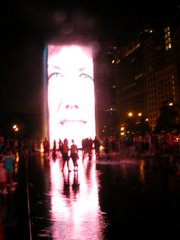Hat tip to the Republican Jewish Coalition
T]hank you for the opportunity to talk to you this morning. No one is working harder to take our party's message to new communities and new voters and bring new people into the Republican Party than the Republican Jewish Coalition.
If any group stands for the spirit that our party needs this year and next year, it's the RJC.
A lot of you are the first Republicans in your families, right? Am I right?
A lot of you get grief for being Republicans, right? As a three-time candidate and eight-year mayor of New York City, I know what you're talking about. Wow.
I remember this happened so many times, I get all the incidents confused. But one that was particularly poignant was this man who was very, very old and frail came up to me and he grabbed my hand and he said, You're the first Republican I ever voted for. I said, How old are you? He said, I'm 92 years old.
I said, In over like 80 years of voting or whatever, you couldn't find another Republican to vote for? He said, I thought it was sinful.
True story. I remember the moment that I knew Ronald Reagan was going to be president of the United States. I remember it. I was at a bar mitzvah reception in Manhattan. I went to the bar mitzvah in the synagogue and then I went to the reception.
The table was filled with people that lived in Manhattan, east side, west side. This is the 1980s. This is before the Republican Jewish Coalition did all its good work. So you would think most of the Jewish community overwhelmingly Democrat.
I'm sitting at the table. One after one, everybody's talking about voting for Ronald Reagan. This is New York, in Manhattan. This is a city Abraham Lincoln didn't carry.
I swear. That's why, you know, when they want to know, Are you a real Republican, I gave my blood for the Republican Party in New York. I often say that I was the first Republican mayor of New York in 25 years and I was the first one to remain a Republican in 50 years.
But like Ronald Reagan, we need an inspiring – we need a realigning of candidates for president. We need a coast-to-coast candidate.
We need a candidate that, you know, the day after the nomination, we don't close down our offices in 20 states or 25 states, like we've been doing. Right? We don't win this next election if we don't run a campaign in New York and California. I tell you, we don't.
Do we give it away again? The margin of error isn't what it used to be. We decide to kiss away New York, California, Connecticut, New Jersey, Pennsylvania, Washington, Oregon, Illinois, Wisconsin, Minnesota, Michigan, wow.
We ask Florida to do a lot, but...
Right, Mel? I mean, I know you guys are great, but -- and I believe that I'm your candidate. I'm the one who can be a coast-to-coast candidate.
And I'm honored to stand with the Republican Jewish Coalition. Let's talk a bit about Iran.
As we all know, Iran is seeking nuclear weapons and they're threatening to use them. And through Iran's proxy, Hezbollah, Iran has become the leading state sponsor of terrorism in the world.
Now, this isn't -- this whole development with Hezbollah is not new. For a lot of people, they think this is new. It isn't. Hezbollah killed more Americans than any other terrorist group before September 11, 2001. Hezbollah suicide murderers killed more than 300 American and French troops in Lebanon in 1983. They hijacked a U.S. airplane and murdered a U.S. Navy [diver], Robert Stethem, in 1985.
And we can go on and on and on. They captured a U.S. CIA station chief in 1992. In 1994, you remember, I remember them very well, because I was mayor then, you remember the attacks against Jewish targets in Argentina, killing all together more than 100 people.
So this is a group that operates as a terrorist group all over the world. They seek out Americans, they seek out Israelis, they seek out those who are allied to us.
Now, Iran, this nation that's been a rogue or run by a rogue regime now for several decades, is assisting terrorists who are killing American troops.
We've seen what Iran will do with ordinary weapons. If I'm president of the United States, I guarantee you we will never find out what they will do if they get nuclear weapons, because they're not going to get nuclear weapons.
Thank you.
You know, there are people that say that we have to accommodate ourselves to a nuclear Iran. We can have something like we had during the Cold War. We can have some kind of accommodation. We can have mutually assured destruction or damage.
I've read those articles in foreign policy magazines and on the editorial pages, op-ed pages of newspapers, and I can see the movement kind of building for that.
Well, you know, what was the worst nightmare of the Cold War? The worst nightmare of the Cold War was nuclear weapons falling into the hands of irresponsible people. In that respect, we were fortunate. The Soviets were horrible. They were, as Ronald Reagan said, an evil empire.
Communist China, no different. But at least in both of those situations, there was a residual self-interest or you might even call it a residual rationality that said, We don't want to die. We don't want to lose Russia, we don't want to lose China. There's too much at stake here.
The reason I come to the conclusion that I do about Iran is not out of any desire to ever have to use American military power. I think anybody who wants to be president of the United States would say a prayer at the beginning that you would never have to use American military power.
But a president of the United States can't hesitate to do that if it's in the best interest [of the nation.] …
If we learned anything from the 20th century from dealing with Nazis, Communists, and Islamic terrorists, if you haven't learned this lesson, I don't think you lived through the 20th century, you have to stand up to dictators, to tyrants, to terrorists.
Weakness invites attack. Strength keeps [us] safe.
And I believe we're the ones that really want peace in the Middle East, real peace, what it really means. Peace has to be based on realism, not romance. It's shocking that 60 years after the Holocaust, the Jewish people are still required to negotiate for the right to exist.
This should be beyond negotiation. Someday I hope that Jews and Arabs can sit down together to negotiate borders, water, trade. It's going to happen, but it's going to happen more quickly if we remain strong and we remain really, really clear.
You cannot negotiate with someone who is threatening to destroy you and your family.
This is the great fallacy in this now very strong Democratic desire to negotiate, negotiate, negotiate and negotiate. You've got to know with whom to negotiate and with whom you should not negotiate.
When Barack Obama, a couple of months ago, said that he would invite Ahmadinejad, Assad, Castro and Chavez -- did I miss somebody -- to Washington in the first year that he's in office to meet with them, without preconditions, when he was condemned by Hillary Clinton, who now has joined his position, but that was the one of the longest positions she's held, by the way. She held that one for two months.
That one she held for two months. But at that time, she said he was wrong. That's the first time I agreed with her since the time that she announced she was a Yankee fan.
Now she's taken the rug out from under my feet. But he announced that he's going to negotiate with these people without preconditions and then he went on to explain, well, Ronald Reagan negotiated with the Communists.
I say this most respectfully. You're not Ronald Reagan, you know.
Here is what Ronald Reagan did before he negotiated with the Communists. First, he called them the Evil Empire. Then he took missiles, intermediate range missiles. I know this because I represented him in court when this was challenged.
And he pointed them, he put them in European cities and he pointed the missiles at Russian cities with names on them and then he said, in his very nice way, Let's negotiate. (APPLAUSE) …
In 1995, when, as Sheldon mentioned, I had Yasser Arafat thrown out of the United Nations...
... that was a Freudian slip. I didn't have him thrown out of the United Nations. I had him thrown out of the United Nations' concert at Lincoln Center. I think it was a Freudian slip because you might have gotten the point of whether I really would have liked to have done.
I helped to keep him away from the United Nations in the 1980s, but that's a different story.
When I made that decision, which had to be made right at the moment, because I went out to give a curtain speech, it was for a performance of Beethoven's 9th Symphony, great work of art, a great piece of music, one that's dedicated to peace, and I did find some real incongruity in the idea that he was coming to that concert.
But the thing that really bothered me was he didn't have a ticket.
He was a freeloader. Just like he stole all that money and sent it to the south of France, he didn't pay for his ticket.
But in seriousness, the truth is I was informed that he was there and I had to go out and give a curtain speech. I didn't hesitate, like Hillary Clinton hesitates to answer questions on what she's going to do about Iran. I didn't seek to negotiate with him, like Barack Obama would do or says he'd do with these people.
I didn't call for a team of lawyers to help me...
I didn't call for a team of lawyers to tell me, Well, on the one hand, you can throw him out, but on the other hand, you can't, and maybe you can partially throw him out. Maybe we could have him sit like further up.
I just made a decision. See, I lead. That's what [being a] leader is about. A leader has the confidence to make a decision.
So the administration was real angry at me. President Clinton condemned me the next day. I framed the article.
The United Nations -- the United Nations, they were going to condemn all of New York City, I think, for what I did. But it turned -- I knew. …
The reason I did it was I knew from my own investigations of Arafat that he was a murderer and a terrorist, that he had killed many Israelis, killed many American citizens. The case with Leon Klinghoffer was the one that probably I knew the best.
And I also thought from the very, very beginning, when they first started negotiating with him, that this whole idea of holding him on a morally equivalent plane to like the prime minister of Israel, like these two people are equal, was a terrible, terrible mistake and I believe that set back the whole cause of peace in the Middle East, maybe for at least a decade and maybe even longer. I hope not.
Similarly, that's the reason I rejected the $10 million check. Prince Al-Waleed came to Ground Zero, like many people did. He came with a group. It was very early in the morning. I was asked by the State Department to take people there and the reason I think the State Department wanted me to do it was because was, quite obviously, first of all, people were moved by it and, number two, it might build support for what they knew they were going to have to do.
And I took many, many leaders and people there, many families and other people, and there's not a single person of any political persuasion, political party or whether you're talking about heads of state, like Putin or Chirac, or you're talking just about ordinary people or children, I didn't take one there that wasn't legitimately moved by it.
When I took Al-Waleed there and I stood there for a while and answered his questions, I felt something funny. I mean, it's just a feeling you get. And when you deal with people as much as I have and you have, you obviously get an instinct from them. Sometimes your instincts are right. Sometimes your instincts are wrong. And when I left to go to a funeral, I almost felt bad and I said, Well, maybe my instincts were wrong here. He did come and he did give us a check for $10 million for the firefighters' and police officers' families, which is a wonderful thing to do.
And then I went to the first funeral, and I don't remember if it was the second, and I got a call from my press communications director, Sunny Mindel, and Sunny said, Al- Waleed did something very, very surprising. He held a press conference after you left and he put out this press release and she read the press release to me and basically, as I recall the press release now, it said that, in essence, America has if not all, some of the responsibility for the attack of September 11 because of the foreign policy that we pursue.
It mentioned some other particulars, but it said, and because of our strong support for Israel and that we should think of changing that.
And I said, Sunny, I can't keep this money. I mean, this is exactly what's wrong. This is this moral equivalence.
Israel's not perfect and America's not perfect, but we're not terrorist states and we're decent countries that have the right motivations. And I said, Well, I'll be back in about an hour, after I finish this one more, I think, funeral and I said, You know what I'm going to do? It's not my money. It doesn't belong to me.
It wasn't given to me personally, thank goodness. Right? Mayor of New York, you get any money personally and they take you away in handcuffs.
It wasn't even given to the city of New York, which would be my kind of fiduciary responsibility. It was given directly to the families of these firefighters and police officers and we organized that charity -- we organized that charity so every penny -- there'd be no diversion of administrative costs.
So if you gave me a check for $10 million, I could say to you, honestly, that $10 million is going to go right to a firefighter's family, a police officer's family, a rescue worker's family.
So it was all their money. We're like just transferring it. So I called -- first, I called my fire commissioner and police commissioner and, of course, they told me -- I won't even tell you the language they used. …
The reality is there are many, many grievances and injustices in the world. We have some within our country. There are some in Israel. There are some all over. We've got a lot of things we have to correct.
But these people are attacking us not for the things that are wrong about us that we have to correct. They're attacking us for the things that are right about us.
I mean, they're attacking us for the good things about us. I mean, why are they doing it? They're doing it because -- my wife and the wives of the other candidates addressed a women's breakfast this morning. You think they have women's breakfasts with political candidates speaking in Islamic terrorist countries or countries that support Islamic terrorism?
Imagine if they showed up for a breakfast. Maybe they'd get stoned. They don't want women to have rights. Let's just deal with it. I mean, that's just the reality. They don't want to allow them to have rights. …
I mean, there's no room for compromise on these things. Like I was saying about Israel earlier, you can negotiate with all kinds of people. You can even negotiate with bad people if there's some degree of rationality left, if there's some ground for negotiation.
But you can't negotiate with people who want to kill you and destroy you. I mean, think about it in the case of your family.
Think about it in the case of your family. Somebody threatens to kill you and your family. What are you going to negotiate with them about? How many of your kids they're going to kill or when they're going to do it?
You've got to negotiate with people that at least make a step toward giving a reasonable possibility of getting a sensible result.
In the case of the Palestinians, here's what it is, two big ones. First of all, the Palestinians have to say and acknowledge and mean it that Israel has a right to exist as a Jewish state.
Number one, because Israel's already negotiated its existence. That negotiation happened a long time ago and that's over and they've just got to kind of move on.
Second, second, they have to be willing to say, We forsake terrorism and we're going to help to reduce and eliminate terrorism and they need to show their good faith by that condition remaining that way for some period of time. It's as simple as that -- or as hard as that. They do those two things and they mean it and time demonstrates that they do mean it, then, of course, they can negotiate. We would like to negotiate. We would like to have peace, but we don't want to have a peace in which we're taken advantage of.
We don't want to have a peace … in which have the name peace and Israelis and Americans are getting killed and we certainly don't want to create another terrorist supporting state. We have too many of them already. …
John Kennedy once said that the first World War began … because of ambiguity and lack of clarity. And the reality is we've got to be clear and the clarity has to be we're not going to allow Iran to be a nuclear power. We do not want to use a military option. Using a military option would be dangerous, but certainly will if we have to, and American presidential candidates should be clear about that.
Subscribe to:
Post Comments (Atom)














No comments:
Post a Comment